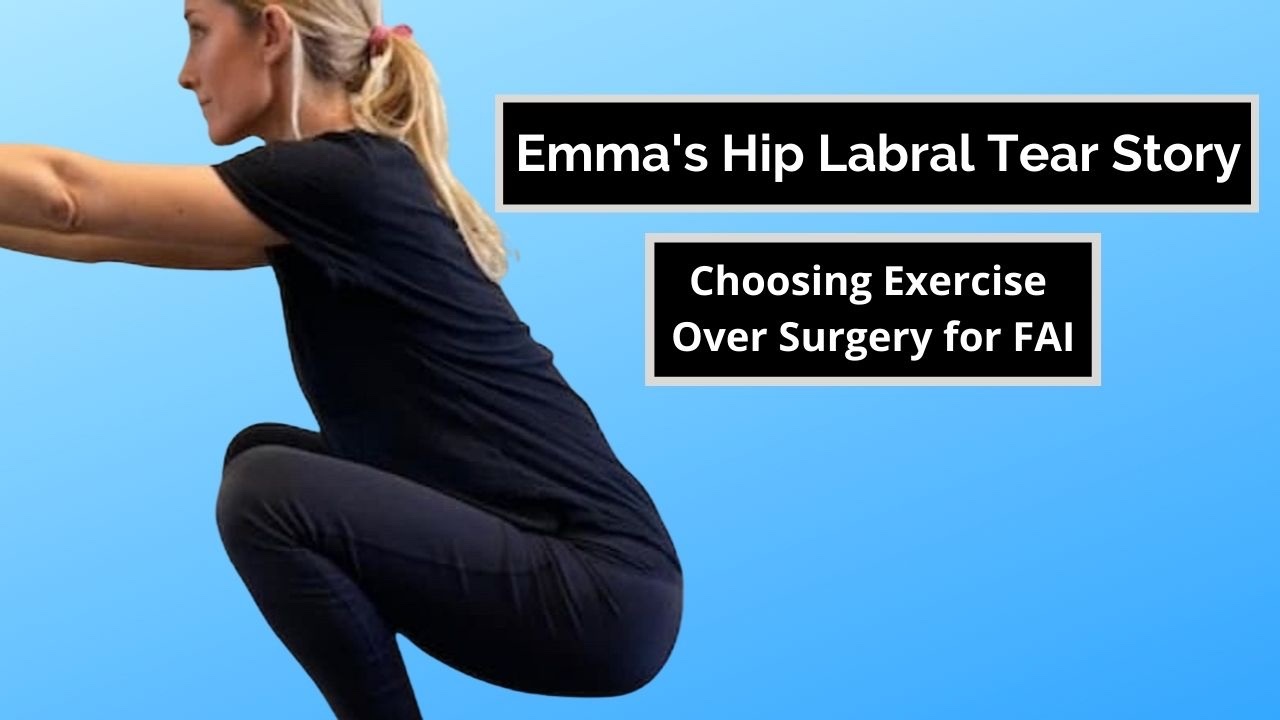Success rates for hip labral tear surgery. Know the data.
Jan 23, 2023
None of the conservative treatments for your hip labral tear worked. This means that the only option left is surgery.
You’ve been going back and forth for weeks or months. Get the surgery. Try more PT. Get another injection.
If only there was some easy way to know how other people felt after getting surgery. If there was a 99% success rate for hip labral tear surgery then no brainer right?
As you might have discovered, that information is not easy to find. The data is all over the place and it’s difficult to make sense of what the actual success rates for hip labral tear surgery are.
Well my dear hipster, you’ve arrived in the right place. Over the last 11 years, I’ve dug DEEP into the data to get a solid picture of how most people feel after getting surgery.
I’ve read and reviewed research studies, articles and first-hand accounts detailing peoples’ experiences after getting surgery.
Why you might ask? Because I was where you were 11 years ago. Diagnosed with a hip labral tear and confused about what to do.
Fast-forward to today, I’ve dedicated my life to helping people get out of chronic hip pain. And a major part of my client base are people who are diagnosed with hip labral tears.
This is why I understand how important it is to understand what the success rates for hip labral tear surgeries really are.
Hip labral tear surgery success rates
What most people diagnosed with a hip labral tear want to know is quite simple. Will surgery get rid of their hip pain?
I get it. When I was diagnosed with a hip labral tear 11 years ago, that’s what I wanted to know too.
Like you, I scoured the internet for information. I wanted to know whether surgery would get rid of my chronic hip pain. Nothing else did.
I wanted to know: did the surgery work for other people with hip labral tears?
Unfortunately, there is no yes or no answer to this question.
Some studies show high success rates while others show relatively lower success rates.
Before we dig into those studies, we need to ask ourselves what defines a successful surgery? In the surgeons’ eyes, if the labral tear is “fixed” then the patient is “fixed.”
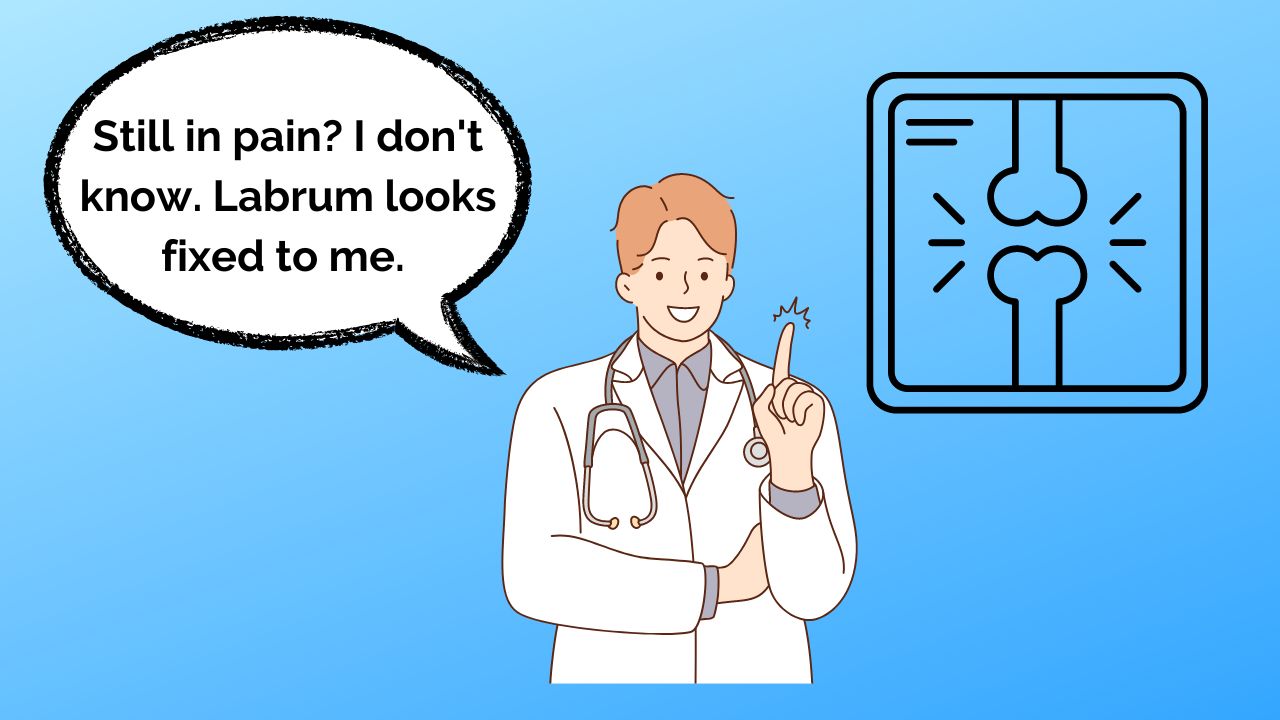
Even if the patient still experiences hip pain.
This is why many studies are not done on “success” per se but patient satisfaction. This is obviously what matters MUCH more.
Did the surgery meet the patients’ expectations? Did the patient see a major reduction in pain symptoms? Simply put, are the patients that received surgery satisfied with the results?
In one 1999 study, researchers found that most patients were not satisfied after getting surgery.
In that study, 28 patients that received surgery to repair a hip labral tear were contacted a few years after the procedure.
Out of those 28 patients, 8 had to get a hip replacement for that same hip within 1-5 years after the surgery.
Only 13 out of the 28 patients, or 46%, reported “good to excellent results.” Another 3 suffered hip labrum surgery complications in the form of nerve palsies.
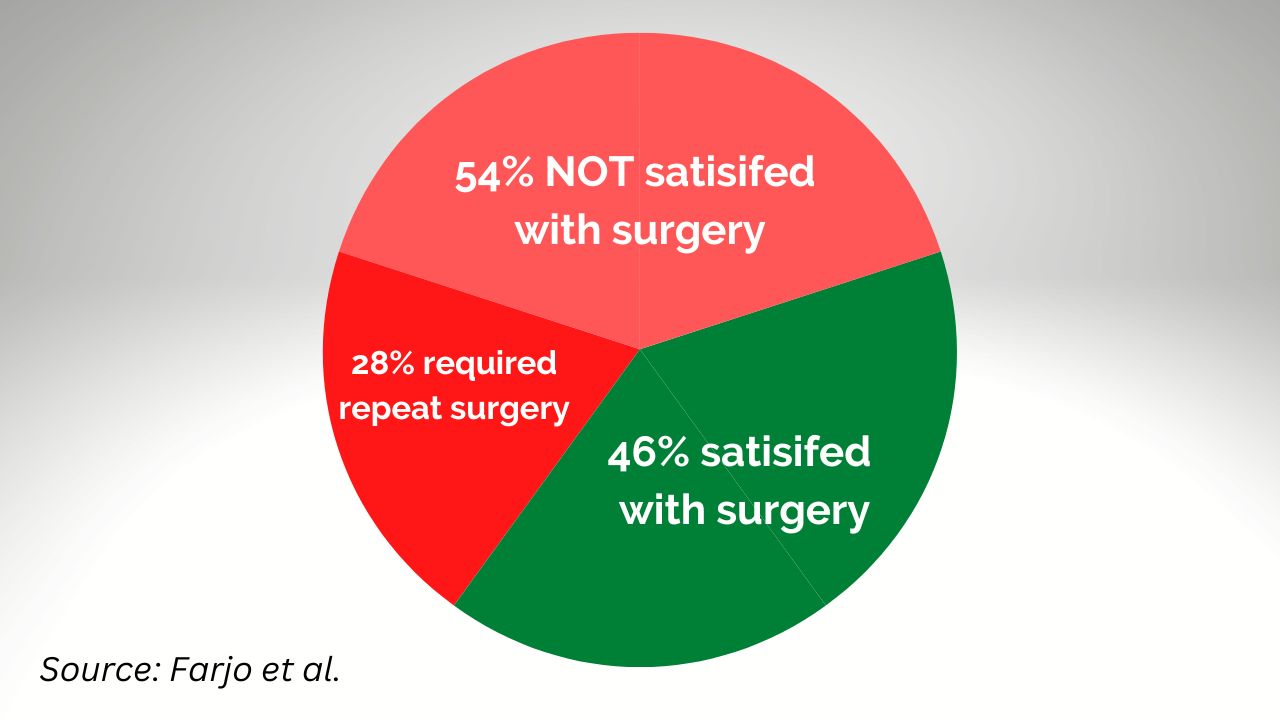
Then there is another troubling study published in 2009 that followed up with patients who received surgery for a labral tear and hip dysplasia.
Out of 34 patients, 24 failed to see a reduction in pain after surgery. Even more alarming, 16 of the 34 patients had to get another surgery at the time of follow up.
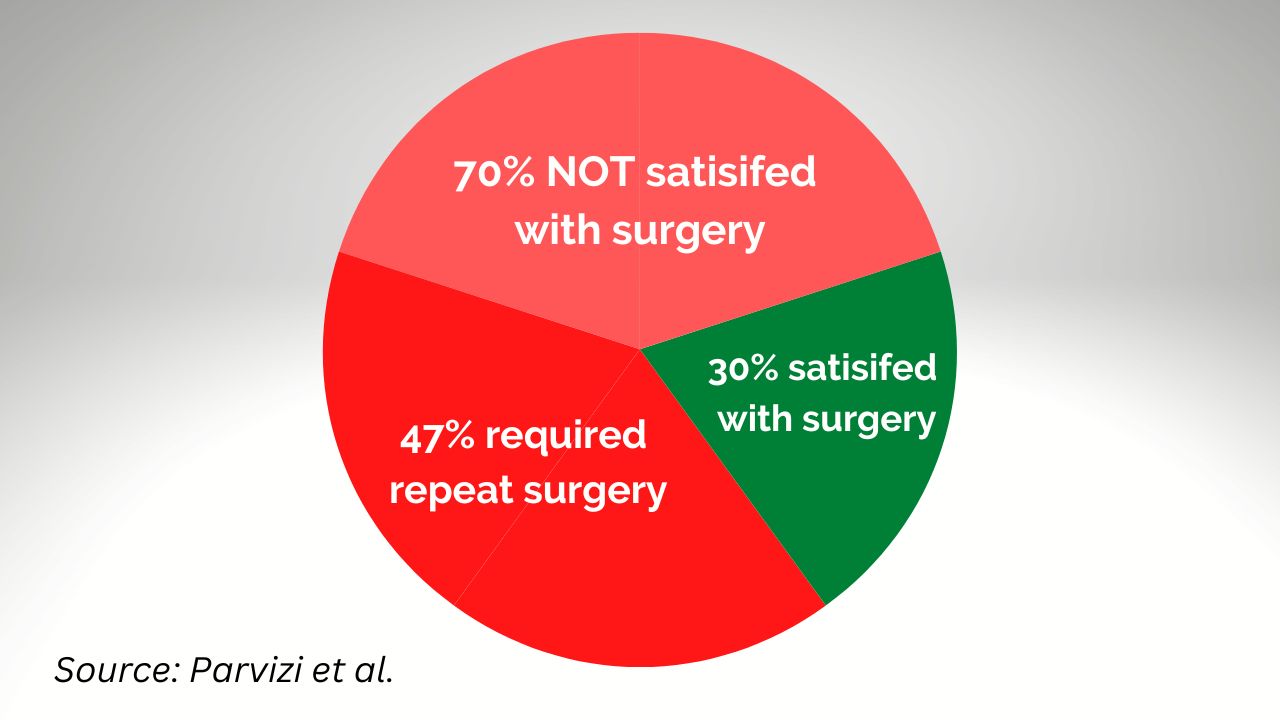
To be fair, there are studies that show better results than the ones I referenced above.
Like this one for example where 89% of patients reported “clinical improvement.”
Or this study where 67% of patients reported they were “pleased with the result of their operation” and the other 33% “were not satisfied.”
One fact is clear: there is no consistency in the literature. Some studies show good results while others show poor results.
If a treatment truly worked, wouldn’t we see more consistency in these studies?
In addition to a lack of consistency, these types of studies have even more problems which we will explore in the next section.
Why studies don’t adequately show hip labral tear success rates
As explained earlier, it is the reduction of hip pain after surgery that matters to us. What good is a repaired labrum if it doesn’t heal the pain?
That is why studies trying to identify surgical success rates rely on questionnaires. A popular type of questionnaire is called the International Hip Outcome Tool aka the “ihot-33.”
Questions are answered from a scale of 0 to 10. These responses are then averaged out to determine whether a study participant was “satisfied” or “pleased” with the surgery.
Here is a copy of the questionnaire if you’re interested in reviewing it.

An average of a 6 instead of a 4 on these responses would likely categorize you as a “success” since your score went up.
This is especially true if your average score was a 2 before the surgery and went up to a 5 or 6 after the surgery.
What most people contemplating surgery want to know is whether the operation will get rid of the pain.
We don’t want to know whether the ease of walking went from a 3 to a 6 in some subjective and arbitrary questionnaire.
Then there is the issue of bias. Think about which entities have the resources to perform million dollar research studies like this?

Journals funded by orthopedic surgeons. It is not in their best interest to publish studies that show low success rates for surgeries they get paid a lot of money to perform.
Another major issue is sample size. 38 patients, 28 patients, 58 patients. These are low numbers.
There may be some unrelated reason why this small group of patients had more or less success.
We want to see numbers in the thousands to get a better idea of how it would affect the general population.
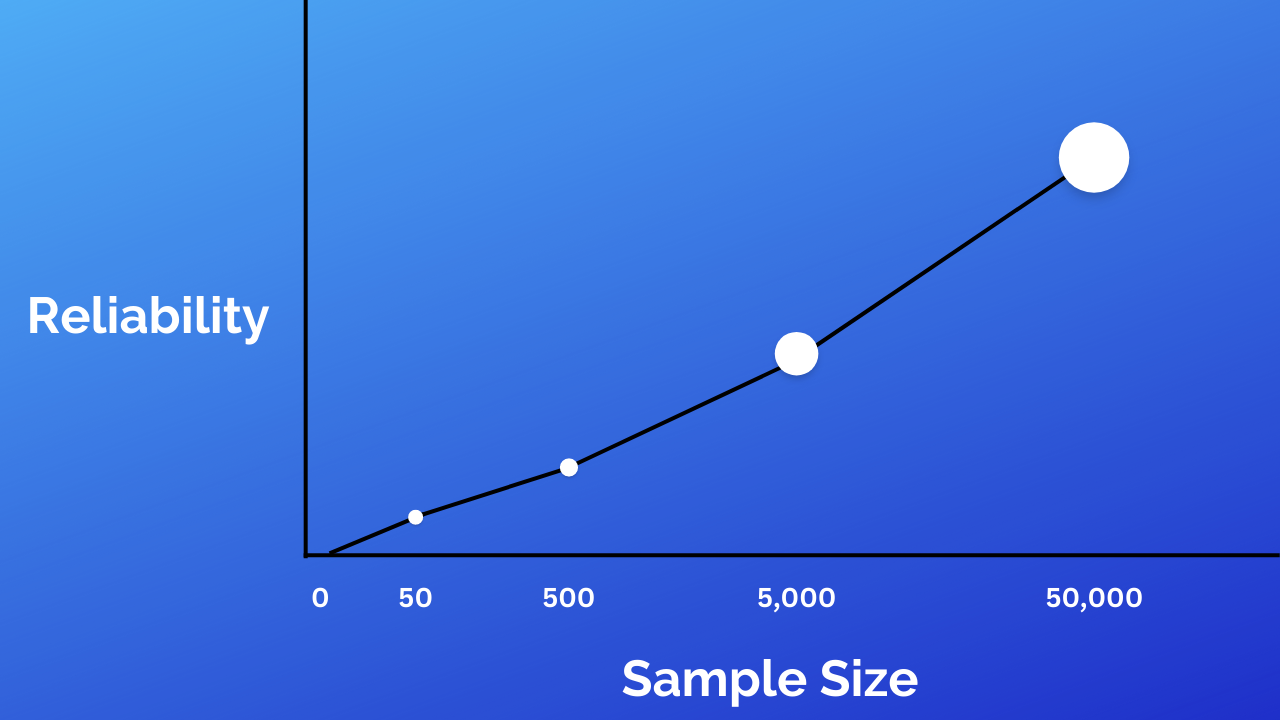
I know what you’re thinking to yourself.
“Thanks Maks, now I am even more confused than before. You still haven’t helped me get an idea of what the success rates for surgery are. And that’s why I’m here!”
I get it. And I have a recommendation for a different approach.
Instead of relying on studies, I suggest looking at how other normal people like you fared after surgery.
In the next section, I’ll provide some guidance on how to get started.
A better way to identify hip labral tear surgery success rates
I’ve created a healthy amount of content about my FAI and hip labral tear story.
Both on my blog and my YouTube channel.
I’ve also shared success stories from students with hip labral tears that worked through my Happy Hips curriculum.
But none of us ever got surgery to repair a hip labral tear.
I started thinking: there must be blogs written by people who DID get surgery to fix a hip labral tear.
Maybe that would be a good way to help people determine whether surgery is right for them?
Why not read stories from people who got surgery and then blogged about it? How were they doing a year or two years after the surgery?
No weird questionnaires. No bias. Just people truthfully sharing their experiences.
I found a bunch of blogs like this! I don’t know what took me so long to do this research. But I'm happy I did.
I discovered an important pattern when reading these stories. Not one of them ended up saying that the pain was gone after surgery.
Some of these blogs provide updates years later. But there is never a full-out statement that the pain was gone.
As you’ll see, it’s not ALL bad. There is certainly some reduction in symptoms but these recollections sound similar to many people who never get surgery.
As a disclaimer, I am not sharing any stories from orthopedic surgeons’ websites.
And to be objective, I am also not sharing blogs on websites from professionals selling services to heal hips without surgery.
Below is a list of people creating their own blog and writing about their experience after surgery:
Rachel’s experience 2 years after getting surgery for a hip labral tear. Full blog.
- “Standing long hours never bothered me before the injury, but now I have to manage the number of hours I stand in a row and the number of clients I see per day. “
- “[Overdoing it] results in me icing my hip the next day, treating my piriformis muscle with a tennis ball, and getting on the elliptical for range of motion.”
- “Having been on the other side of surgery for a few years, I can honestly say that I am glad I did it. Was it difficult? Yes. Would I do it again? Yes – both because of pain and instability, but also to prevent more degeneration in my hip and stave off an early hip replacement.
Sarah Jane’s experience 1 year after getting surgery for a hip labral tear. Full blog.
- “I have noticed that my surgery hip gets tighter much easier when I do glute exercises and stuff, so I have to keep working on the knots in that hip.”
- “The aching in my hip joint if I sit too much has improved, but I’m still quite tight in my inner thigh muscles. I have some adhesions and things I need to keep working on from surgery.”
- “I still have discomfort when I try to do a knee to chest stretch with that hip, so I’m not sure if that will always be there or I just need to work on improving that mobility somehow. Something I need to ask the nurse about at my surgeon’s office I guess.”
Annette’s experience 10-24 months after getting surgery for a hip labral tear. Full blog.
- “Eleven months in, I. . . got another cortisone injection. Like the first injection I had gotten before the surgery, it just upset my hip joint even more.”
- “I could not sit without pain until 14 months postop. I always had to manage how and where I sat.”
- “Would I do the surgery again? Honestly, I don’t know. Rationally speaking I probably didn’t have a choice. The labral tear not only caused me pain when sitting, it also meant constant inflammation in the hip joint. Over time, my hip would have deteriorated from that until I would have needed a hip replacement.”
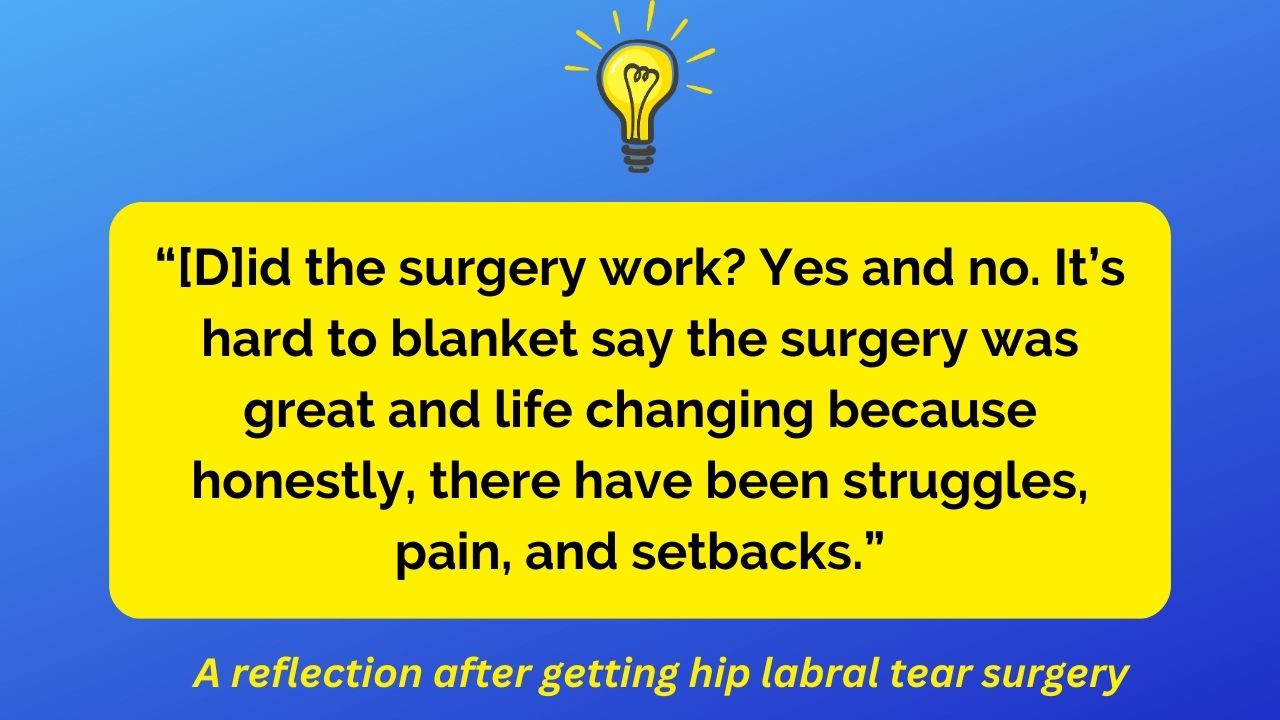
Stephanie’s experience 1 year after getting surgery for a hip labral tear. Full blog.
- “[D]id the surgery work? Yes and no. It’s hard to blanket say the surgery was great and life changing because honestly, there have been struggles, pain, and setbacks.”
- “[I am] s]till dealing with residual tightness one year after surgery.”
- “I am experiencing sharp hip pain at random. Not sure if it’s muscular tightness, something pinching inside the joint again, or arthritis. But it is concerning to have gone through this whole process and still have sharp pain."
Sharp pain, stiffness, tightness,, pinching, inflammation, and discomfort.
Pain after standing, sitting or walking for long periods of time.
These are not the types of status updates you’d expect to hear 1 or 2 years after getting surgery. This is usually what you hear BEFORE someone gets surgery.
It’s also noteworthy to notice what some of these bloggers write when reflecting on whether they regret getting surgery.
They say they’re happy with the surgery because of what might happen to the hip in the future.
“Would I do it again? Yes…to prevent more degeneration in my hip and stave off an early hip replacement.”
“Would I do the surgery again? Honestly, I don’t know. Rationally speaking I probably didn’t have a choice. The labral tear. . . meant constant inflammation in the hip joint. Over time, my hip would have deteriorated from that until I would have needed a hip replacement.”
This is something they were told by their doctors. There is no way to truly know whether more degeneration would have happened.
On top of that, there are non-surgical things you can do to prevent degeneration in our hip joints.
In the next section, I will share what those things are.
Conclusion - the Path out of Chronic Hip Pain
I have tons of resources on my site to start your journey toward pain-free hips.
But I’ll leave you with three important things to think about today.
Number 1 is that hip labral tears are not correlated with hip pain.
Although it sounds like something that would hurt, studies have shown that most people have labral tears even if they don't have hip pain. A hip labral tear is simply a “wrinkle in the inside.”
Number 2 is to zoom out and start looking at your body more globally. The area that hurts is rarely the problem.
If anything, the symptomatic hip is likely working extra hard to make up for other weak areas in the body.
And finally, number 3 is to recognize that chronic pain is just as much psychological as it is physical.
Pain comes from the brain, not the hips. Addressing our psychology is a critical step in recovering from chronic pain.
Surgery is always an option. That option is not going anywhere. Your hip will not deteriorate more.
And even if it does, don’t be fooled that hip labral tear surgery is “minor.” Learn from other peoples' experiences.
The surgery is serious. You go under general anesthesia for hours. And when you wake up, you got a LONG road ahead of you.
Don’t be pushed into surgery for fear of an “early hip replacement.”
If you need a hip replacement, so be it. That surgery is not that much more intense than a hip labral tear surgery anyway.
So take a breath. Set surgery aside for a few weeks and sign up for one of my free courses.
Maybe the path ahead is brighter than you think.
